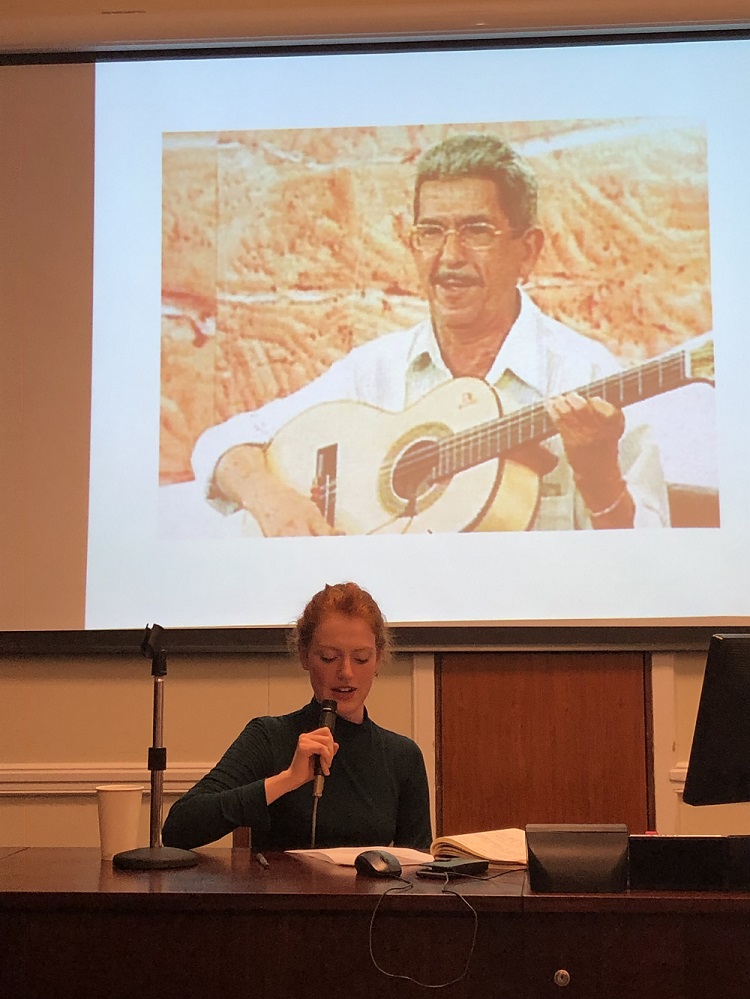Following the success of last year’s Global Portuguese symposium, a follow-on symposium was organised on Tuesday 18 June 2019, just a week after the National Day of Portugal (o Dia de Portugal). Given the large number of Portuguese diasporists in the UK, the event was a fitting occasion to remember Portugal’s achievements and impact globally, combining academic presentations and live performances.

The symposium explored the global impact of Portuguese cultural imprints and transculturation. The papers presented cut across the first, second and third Portuguese empires and included Angola, Brazil, Mozambique and Sri Lanka and were spread across linguistics, literature, song, and religion. Dr Eric Morier-Genoud (Queens University, Belfast) spoke on the Catholic Church, the central institution in Portuguese history, and how religion was regulated during the Third empire, how the Catholic church re-organised as a consequence, and how it expanded in the 19th and 20th Century. He analysed the consequences of the Church expansion for the colonies and its inhabitants, and for the making of a Global Portuguese “Lusotopie”. Dr Shihan de Silva (School of Advanced Study) spoke on Sri Lanka Portuguese, the creolised Portuguese, once an important lingua franca, which has survived for over 500 years but is now endangered. She considered the linguistic situation of a speech community with African roots, in the Puttalam district, in the village of Sirambiyadiya, Northwestern Province, who had shifted to Sinhala. Dr Dorothée Boulanger and Andrzej Stuart-Thompson (University of Oxford) explored childhood in the works of two Angolan writers, José Luandino Vieira and Ondjaki. They analysed how childhood has become a privileged site of projection and construction of the new Angolan nation in the literature of the 1960s and the 1970s, when nationalist parties were fighting militarily, politically and culturally for Angola’s independence from Portuguese colonial domination. Connie Bloomfield (King’s College London) examined how popular poets from Northeast Brazil use classical Greek and Roman myth in their explorations of modernity and racial and class conflict. She looked first at cantoria from the turn of the 20th century, public improvised verse duels which contest individual status, then at printed folhetos or cordel from the early 20th century, finding that Graeco-Roman myths become important to local politics and facilitate the expression of covert popular counter-narratives. She argued that these poetries use European antiquity in a distinctly modern manner to enact social conflicts and community identity.
The presentations were followed by a live performance in the Chancellors Hall ranging from Portuguese folk, Cape Verdean and Brazilian by Natalia Cerqueira with introductions by Margarida Oldland, followed by the sentimental Goan Mando by Hemal Jayasuriya and Shihan de Silva, and ending with the rhythmically driven kaffrinhas and bailas of Sri Lanka by Samadi Galpayage, Hemal Jayasuriya and Shihan de Silva. A roundtable discussion followed after which the delegates networked over a glass of wine. The event was well attended and the diverse audience included staff from the European Commission, High Commissions, academics, researchers and members of the public.
The event was generously supported by the Coffin Fund and the Institute of Modern Languages Research.
Dr Shihan de Silva, School of Advanced Study
